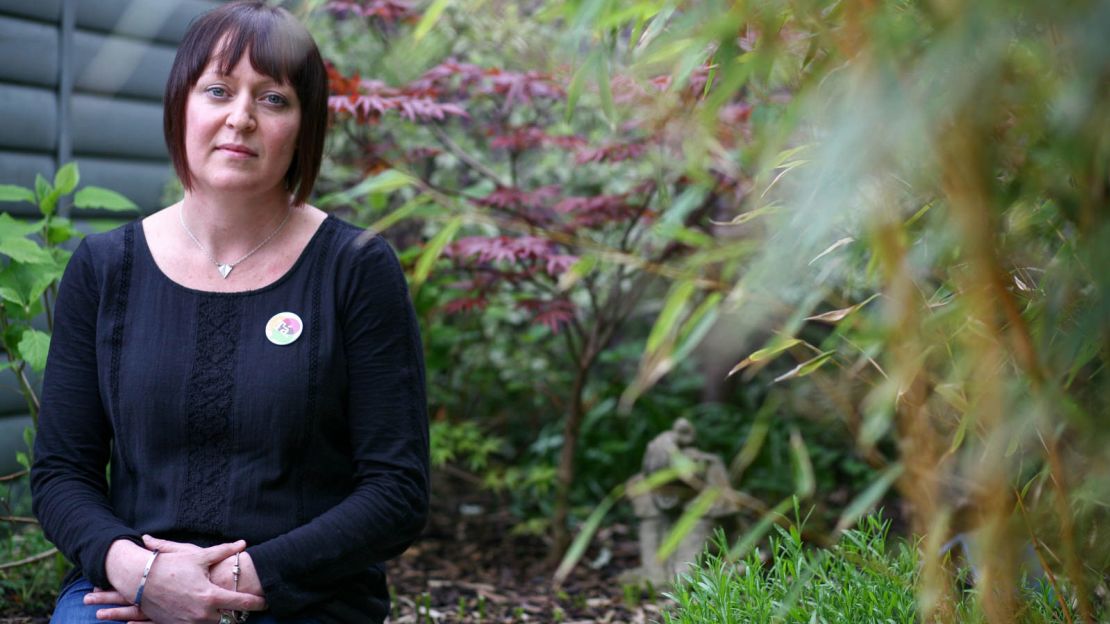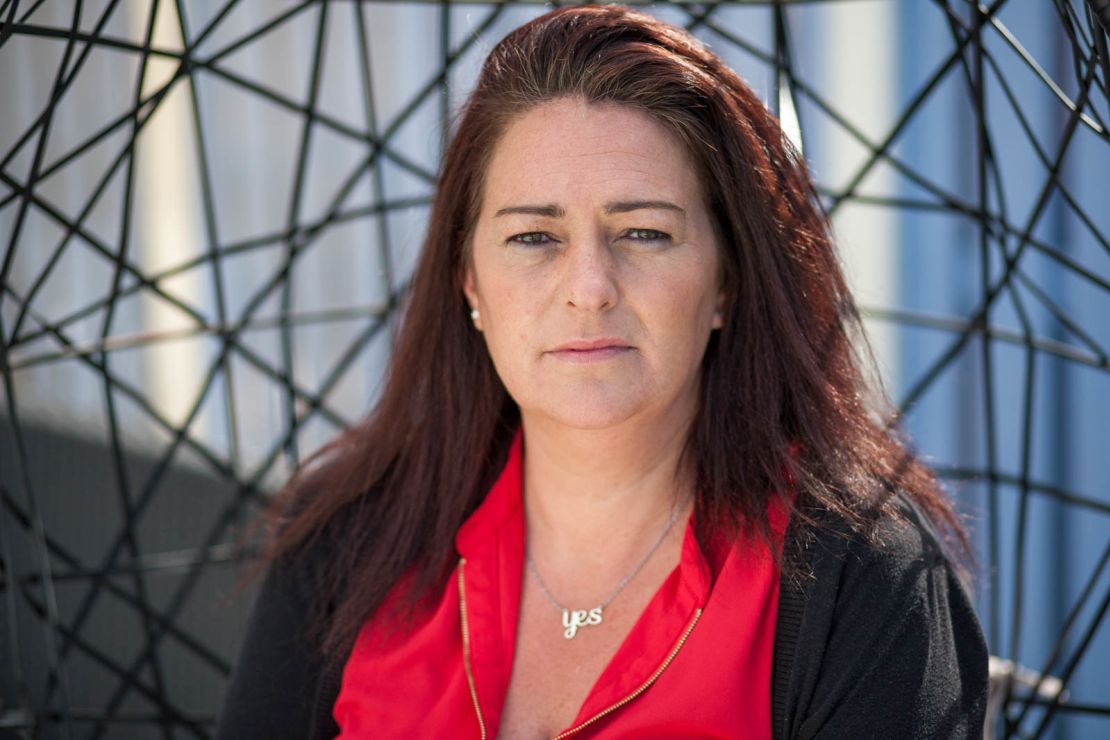Julie O’Donnell was 29 weeks pregnant, on a flight from Dublin to Liverpool that was packed with rowdy holidaymakers, tears streaming down her face.
When she got into a taxi at Liverpool Airport, the driver asked the distraught Irish woman where she was headed.
“You have to say you’re going to Liverpool Women’s Hospital, and they know exactly why,” O’Donnell said. “It’s incredibly awkward.”
Abortion is illegal in Ireland – except when there’s a “real and substantial risk” to the mother’s life – and 3,000 women like O’Donnell travel some 200 kilometers (124 miles) across the Irish Sea each year for a termination in the UK.
Three weeks earlier, a routine scan revealed that her baby had anencephaly, a fatal defect in which part of the brain and skull isn’t fully formed. The obstetrician gave O’Donnell two options. She could either continue with the pregnancy, which would probably result in a stillbirth, or travel abroad.
The 29-year-old was handed a scrap of paper with the name Liverpool Women’s Hospital scrawled across it and sent on her way.
“I can honestly say I’ve never felt so alone and abandoned,” O’Donnell, today a 38-year-old office manager and mother of three, said of her experience in 2010.
O’Donnell and her husband were in shock after the scan. “We couldn’t believe we were going to have to go and organize all of this ourselves,” she said.
Come May 25, Ireland will go to the polls in a referendum on whether to repeal the Eighth Amendment to the Constitution, which says a fetus has an equal right to life as the mother.
A yes vote would open the doors to legislation allowing abortion up to 12 weeks gestation – and later in cases in which there is a risk to the mother’s life or the fetus is not expected to survive.
A no vote would keep Ireland’s abortion laws, some of the strictest in the European Union.
Anti-abortion activists argue that the Eighth Amendment has saved thousands of lives and encouraged compassionate alternatives to abortion, such as perinatal hospice care when the baby is not expected to survive or adoption for women in challenging circumstances.
“So many women have told us that the time it took to plan an abortion in England was the time that they needed to change their minds,” said Anne Murray, spokeswoman for the anti-abortion group Pro Life Campaign.
The Yes Campaign, which is demanding a repeal of the amendment, says it has instead created a culture of shame, inhibited medical professionals and forced women to travel for abortions later in their pregnancies.
“We have a medieval legal provision for sexual reproductive health care in Ireland, and we have not faced this reality,” said Dr. Mark Murphy, a general practitioner in Dublin and lecturer at the Royal College of Surgeons Ireland.
Currently, Irish women caught breaking the law – and the doctors who assist them – could face up to 14 years in prison. What’s not illegal, however, is getting an abortion overseas. On average, nine Irish women travel to England and Wales every day for the procedure.
Often, they’ll travel to Liverpool or Manchester and return the same day. These two English cities not only offer the cheapest flights due to their proximity to Dublin, they can be explained as weekend “shopping trips” or “football games” if their partner joins, according to Donagh Stenson, associate director of marketing at the British Pregnancy Advisory Service (BPAS), a charity that facilitates Irish women’s access to abortion providers across the UK.
“Irish abortions happen; they just don’t happen on Irish soil,” Stenson said.
She recalls a particularly frustrating case in which a woman contacted her who was eight weeks pregnant and in the final stages of cancer treatment. Irish doctors wouldn’t end the pregnancy but also wouldn’t continue her cancer treatment.
“I never knew what happened to her,” Stenson said. “I don’t know whether that lady died before birth. She certainly didn’t travel to us; I know that.”
Stenson says her clients range from just 12 years old to women in their 50s. She said the majority are in their first trimester and opt to have a surgical termination, which is immediate, rather than take an abortion pill and risk it taking effect on the long journey home.
The combined cost of travel, accommodation and procedure can range from a few hundred dollars in the early stages of pregnancy to $4,000 later in the term. For women from rural areas, those with disabilities or migrants juggling visa restrictions, the process becomes yet more complicated and costly, Stenson explained.
Julie: Flight to Liverpool at 29 weeks

O’Donnell was in the later stages of pregnancy when she discovered that her baby had anencephaly, which meant her abortion would involve induced labor.
“They give you a feticide injection, which stops the baby’s heartbeat, and then you’re given 24 hours, so you usually have to wander around Liverpool like a zombie,” she explained. “Then you come back later, and they induce you, like a normal birth.”
O’Donnell and her husband returned to the hospital at 9 a.m. the following day and she gave birth about 12 hours later. The couple returned to their hotel at midnight, and within hours, they were back on a plane to Dublin.
“I remember having to go shopping the next morning because I hadn’t brought the right clothes. I needed to buy tracksuit bottoms; I needed to buy pads,” she said. “It’s horrific when you think about it. I was flying home the day after giving birth.”
O’Donnell said the hospital suite where she was treated was nicknamed the “Shamrock suite,” after its large number of Irish patients.
“Every girl in Ireland knows someone who has had an abortion,” she said. “It’s just nobody talks about it because it’s this dirty little secret and there’s so much stigma attached to it.”
From a young age, O’Donnell was taught that abortion was wrong. “We went to Catholic schools, and even in sex education, they told you that abortion was wrong,” she said.
‘Am I going to hell?’
Ireland’s Catholic heritage has been instrumental in its strict abortion laws, fostering a culture of secrecy in which women are often too afraid to tell family members of their plans to travel.
“We’ve had women in the past ask us, are they going to hell?” Stenson said.
“We’ve even had to arrange for priests to get in contact with the woman because she’s that desperate about the position she’s in and the fact she never thought she’d be here,” she said of abortion advocate priests near women’s clinics.
Murphy believes that the criminalization of a “normal health care procedure” has been massively damaging to the psychology of Irish women. Even when they return home from an abortion, women are often too afraid to seek medical help if there’s a complication.
“There are about 170,000 women walking around Ireland today who since 1980 have traveled abroad to the UK” for an abortion, he said.
“And they have done so in the knowledge that if they told a friend in their local parish or if they told a local priest in their parish, that they could risk being conflated with other criminals.”
Murray sees things differently. “What’s at stake in this debate is the value of life,” the Pro Life Campaign spokeswoman said. “And the sad experience of other countries is that once laws permitting abortion are introduced, they diminish the society’s respect for the inherent value of every human life, born or unborn.”
Lucy: Flight to London at 10 weeks

Lucy Watmough was in her early 20s when she traveled to London for an abortion in 2015, and the secret overshadowed her relationship with family and friends.
“I was tense, and I was stressed, and I was upset, and they didn’t know why, and things became incredibly strained,” said the childminder from Dublin, who says she became pregnant during a fling and didn’t feel ready to become a mother.
“Until one day, I did break down in the kitchen crying, and I just told my mum, ‘I had an abortion.’ And she just hugged me, and she just wanted to be there for me,” Watmough said.
Since going public with her story, Watmough has had an “overwhelmingly positive” response from women in similar situations but says she has also encountered rape and death threats and been spat and yelled at in the street.
Her journey abroad was further complicated by a lapsed passport, and Watmough was forced to wait six weeks for a new one. By that point, she was 10 weeks pregnant.
Sitting at Dublin Airport, the young woman kept expecting a hand on her shoulder at any minute, stopping her from boarding the plane. “I felt like everyone was watching me and everyone knew what I was doing,” she said.
As it was an early-stage abortion, the surgical procedure itself was fairly quick. But on the packed train back to London’s Gatwick Airport, Watmough was forced to stand for over an hour, bleeding profusely and unable to ask her fellow passengers for a seat because there was no way of explaining she’d just had an abortion.
“It’s so suffocating and overwhelming, and you want to get through it the best way you can,” she said. “But the culture of fear is just paralyzing, and it’s that shame and stigma that’s just so ingrained in Irish society.”
‘It sits with you deeply as a doctor’
Because of the logistics of traveling – raising funds, booking flights and accommodation, organizing child care for other dependents – Irish women usually have abortions later in their pregnancies.
This also means they are more likely to have a surgical termination, rather than take an abortion pill, which has a slightly higher risk of complications such as bleeding and infections, according to Murphy.
Irish doctors are also banned from referring women to clinics in the UK, which interrupts the continuity of care.
“It does sit with you deeply as a doctor that you can’t help them,” Murphy said, adding that the health care of Irish women had essentially been entrusted to British Parliament in Westminster.
Meanwhile Murray believes that Britain’s abortion laws had no place in Ireland. “Simply because something is legal in another country does not mean that we should blindly follow suit,” the anti-abortion activist said.
“It is up to us here in Ireland to decide our own laws. We can learn from the mistakes of a pro-abortion culture like Britain,” she said.
Arlette: Ferry to Liverpool at 13 weeks

Arlette Lyons discovered during a routine 12-week scan that her baby had Patau syndrome, a chromosomal abnormality causing severe organ defects. The obstetrician said her baby would most likely die from a heart attack before it reached full term.
When Lyons asked what they were going to do, she was told “there’s nothing we can do. Unfortunately, in this jurisdiction, you have to remain pregnant.”
“I was horrified,” Lyons, today a 40-year-old sales executive and mother of three, said of the experience in 2012.
“The thought of progressing with the pregnancy and getting bigger and people asking, ‘oh, when are you due?’ and ‘have you got the room done up?’ and ‘are you looking for a boy or a girl?’ and all of these questions – I was never going to put myself through that.”
Lyons and her husband, Alan, decided to catch a ferry to Liverpool Women’s Hospital for an abortion, giving her the privacy to grieve – and potentially be in pain – in the back of their car.
According to Stenson, there’s another reason why women with fatal fetal syndromes often take the ferry instead of fly: It’s easier to bring the remains home.
Once at Liverpool Women’s Hospital, the surgical termination itself took no more than 10 minutes, but the trauma of the journey home – curled up in the back of the car, bleeding and in pain “similar to after you’ve had a baby” – has stayed with Lyons.
“All I wanted to do was just to get back home and be in my own house,” she said. “The pain is just awful, and the only place you should be is in bed. You shouldn’t be getting in car, on a boat, in a car again.”
Lyons opted to give the tiny remains up for scientific research and has since co-founded the support group Terminations for Medical Reasons.
“There’s so many secrets and so much pushed under the carpet, and 99% of it is to do with women and how badly women have been treated in this country – and still are today, in 2018,” she said.
Whatever the outcome May 25, the referendum has already shone a light on some of those secrets.
CNN’s Atika Shubert, Hazel Pfeifer, Kara Fox and Sarah-Grace Mankarious contributed to this report.




